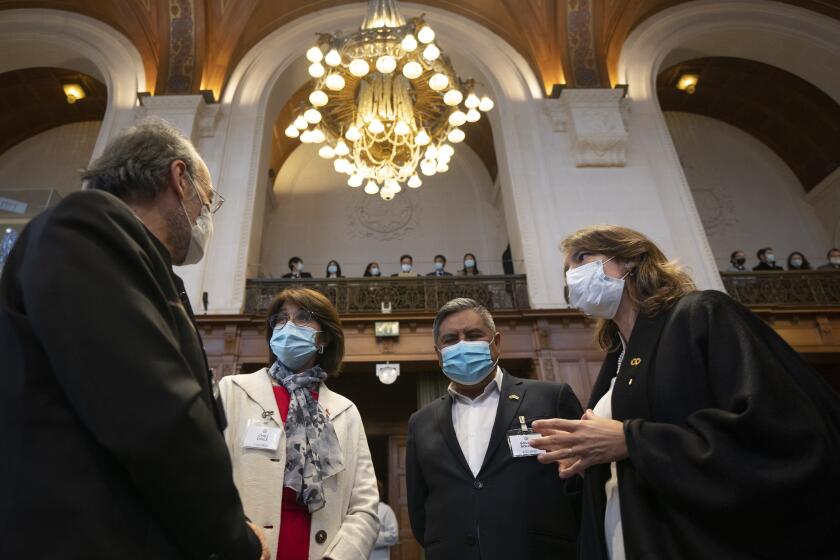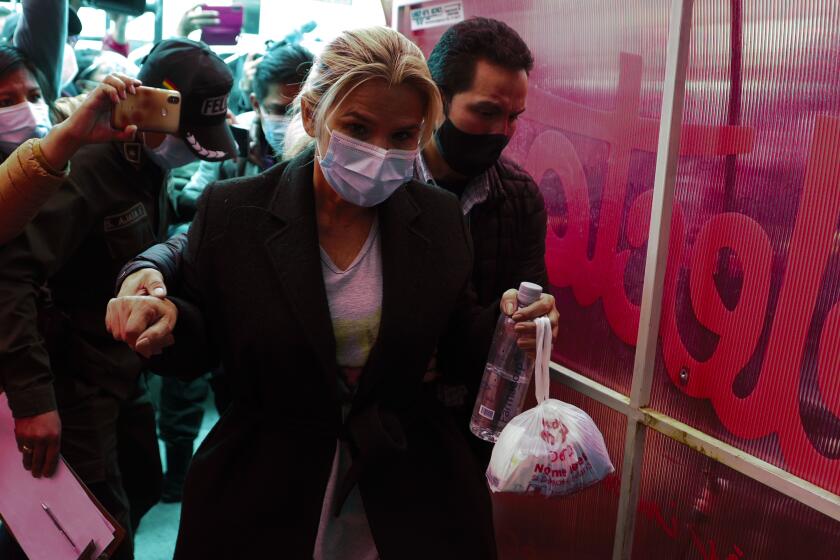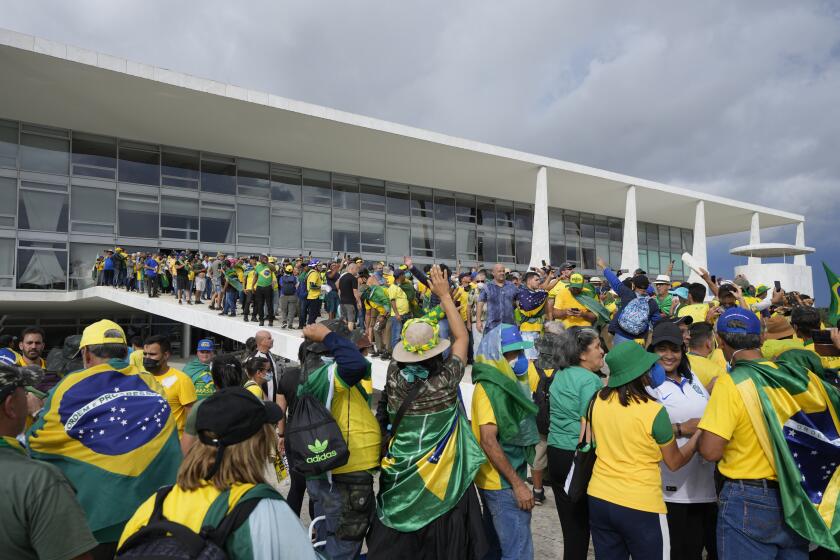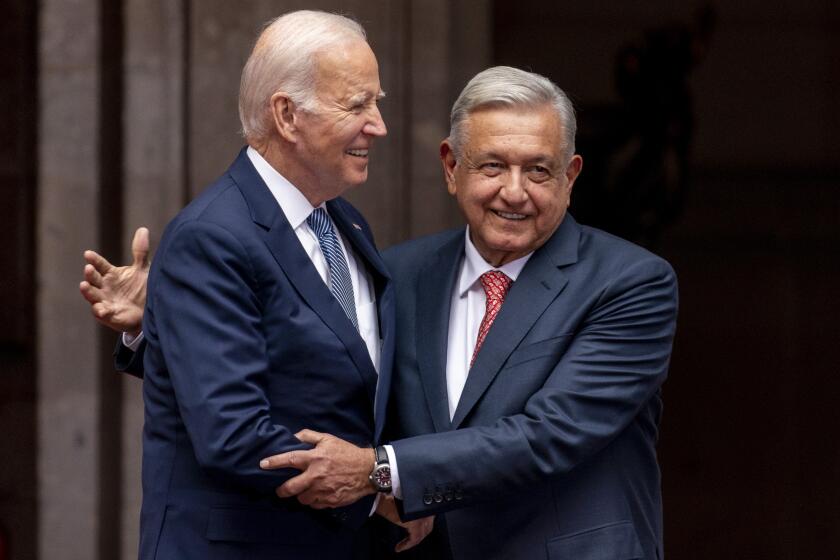Blockades over opposition leader’s detention choke Bolivia’s economic engine
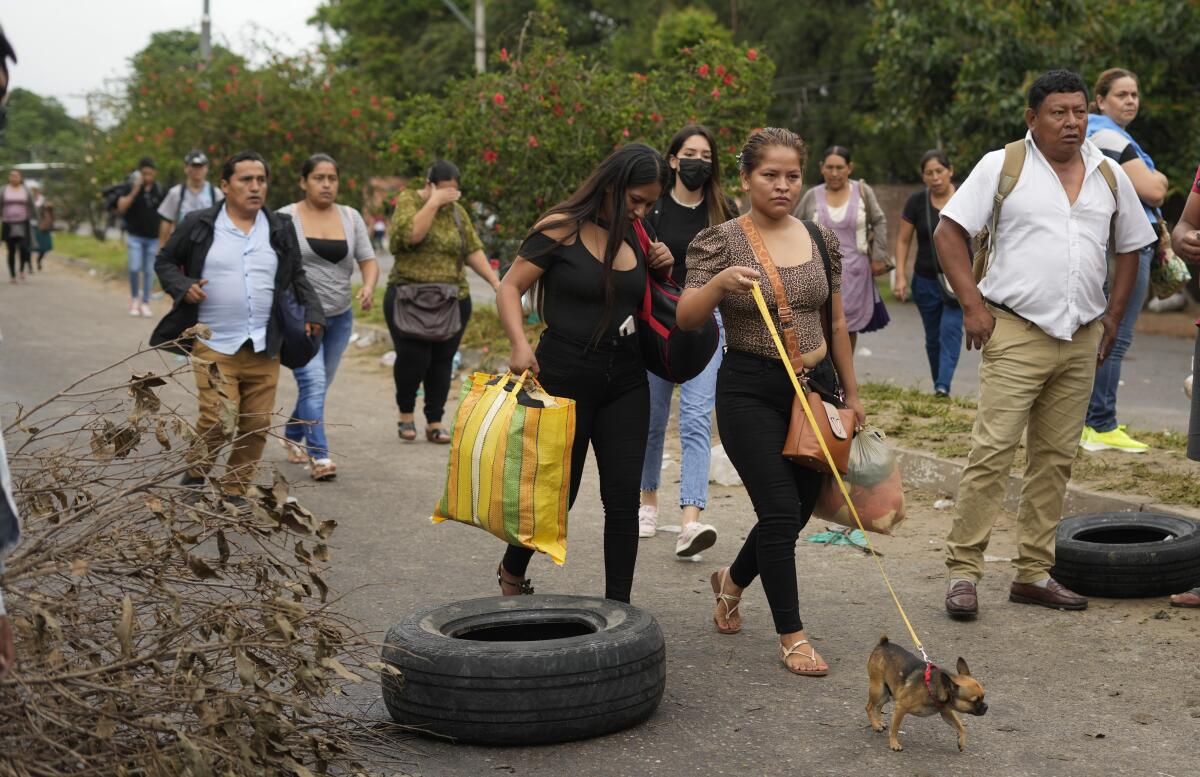
- Share via
SAN CARLOS, Bolivia — Outside Santa Cruz, Bolivia’s most populous city, the highway starts to resemble a parking lot with dozens of cargo-laden trucks stopped in a long line as exhausted-looking drivers wait by the side of the road. Wet clothing hangs from the windows of some trucks.
The vehicles are blocked by large mounds of sand piled on the highway as it passes through the town of San Carlos, 68 miles from Santa Cruz. No cars or trucks pass the mounds — only motorcycles transporting people.
“This measure is to make the government realize that they can’t live without Santa Cruz,” said Micol Paz, a 32-year-old activist with Santa Cruz Gov. Luis Fernando Camacho’s Creemos political party.
The detention on terrorism charges in December of Camacho, the country’s most prominent opposition leader, sparked a series of protests in this eastern region that is Bolivia’s economic engine and farming hub. Road blockades demanding his release, like the one in San Carlos, have thrown the distribution chain into chaos, caused prices to surge and worsened tensions between the leftist government in the capital of La Paz and right-wing opposition based in Santa Cruz.
Camacho’s arrest stems from the protests that led to the 2019 resignation of then-President Evo Morales. Morales’ party, which has since returned to power, accuses Camacho of orchestrating the protests and calls them a coup. The unrest resulted in 37 deaths.
Camacho’s supporters say the protests were a legitimate response to fraudulent elections that were set to keep Morales in power and that Camacho’s arrest constitutes a kidnapping.
The United Nations’ highest court has found little to rule on in a long-running dispute over a small river that flows from Bolivia to Chile.
The governor, who came in third in Bolivia’s 2020 presidential election, is spending his days in a maximum-security prison outside La Paz after a judge ordered him held for four months of pretrial detention, agreeing with prosecutors that he was a flight risk.
Caught in the middle of the dispute are the truckers and consumers hit by rising prices.
Edgar Quispe Solares was visibly angry as he sat in his tractor-trailer, which was transporting cars.
“We’ve been without basic services for a week. we can’t shower, we can’t buy anything,” Quispe, 47, said while he anxiously watched activists apparently getting ready to move the blockade to a nearby town, a sign he might be able to move his trailer for the first time in eight days.
Bolivia’s restored leftist government has arrested the conservative interim president who led the country for a year.
Rómulo Calvo, the head of the powerful Civic Committee for Santa Cruz that called for the blockades, said that while the protests are supposed to continue until Camacho’s release, he couldn’t guarantee that that would actually happen.
“The blockades will last for as long as people who are taking the action can continue,” Calvo said, acknowledging activists’ fatigue after a 36-day strike against the government last fall to demand a national census that would likely give the region more tax revenue and legislative representation.
Santa Cruz plays an outsized role in Bolivia’s economy, making up around one-third of its economic activity. More than two-thirds of the country’s food comes out of the eastern region, which is the center of agribusiness.
“Santa Cruz is a fundamental bastion of the Bolivian economy and that is why it has the power to flex its muscles against the government,” Jaime Dunn, an economic analyst in La Paz, said.
The rioters who stormed Brazil’s capital buildings Sunday used coded language on social media to coordinate and carry out their plans in plain view.
It’s difficult to quantify the direct economic effect of the protests, in part because some trucks are managing to skirt the blockades.
“You won’t necessarily see the impact monetized in terms of amounts, but you will in prices and diminishing Central Bank reserves,” Dunn said.
In markets in La Paz, customers are sparse because the price of chicken has soared by 29% and beef by 8% since the blockade started, according to Marina Quisbert, a leader in a group of butchers at the Rodríguez Market.
It isn’t just meat.
News Alerts
Get breaking news, investigations, analysis and more signature journalism from the Los Angeles Times in your inbox.
You may occasionally receive promotional content from the Los Angeles Times.
“Even the prices of vegetables have increased. If I used to spend 100 pesos, now I have to spend 120,” said Rubén Mendoza, a 65-year-old retired teacher.
The administration of leftist President Luis Arce has played down talk of the economic effect of the blockades, with Economy Minister Marcelo Montenegro telling reporters this week that prices have increased because of “speculation and profiteering.”
Amid the discussion over how the blockades could affect the economy, thousands took to the streets in the capital cities of eight of the country’s nine regions Tuesday to demand the release of Camacho as well as other imprisoned opposition leaders. Smaller counter-protests supporting his detention also took place.
“I feel impotence more than anything, because any of us could be sent to jail for not agreeing with the government,” Karine Flores Mendez, a 49-year-old executive assistant, said as she joined protesters in Santa Cruz.
Editorial: ‘Three Amigos’ summit over, the hard work of U.S., Mexico and Canada policymaking begins
The three North American presidents met in Mexico City this week, pledging increased cooperation on heightened migration in the region, energy policies and trade disputes.
Some also spoke out against law enforcement officers who have clashed with protesters during the frequent nightly demonstrations in downtown Santa Cruz.
“They send police to tear gas us,” retail worker Pablo Vaca, 37, said.
Arce’s administration has accused the nightly protesters of fomenting violence and burning vehicles as well as public offices.
Some people who agree with the aim of the protests say the blockades go too far, including Elvis Velázquez, a doctor who lives near San Carlos and works in Yapacani, about 40 miles away. He is affected by the highway closure.
“I support some measures, but the blockades aren’t productive because they paralyze us as citizens,” Velázquez said as he rushed to board a minivan to Yapacani after crossing the blockade on foot. “They cut us off from each other.”
More to Read
Sign up for Essential California
The most important California stories and recommendations in your inbox every morning.
You may occasionally receive promotional content from the Los Angeles Times.
